
Guests
- Will Potteraward-winning investigative journalist whose work focuses on political repression and the erosion of civil liberties.
We continue our conversation with Will Potter, the author of Little Red Barns, an investigation into the state repression of journalists, environmentalists and animal rights activists who attempt to expose the harms of the U.S. factory farming industry. “This is a corporate versus the people issue,” says Potter, who explains how the exploitative agriculture industry pollutes the environment, abuses animals and partners with law enforcement to criminalize activist movements, all while promoting a “fascist” myth of the “happy farmer and the American countryside.”
Transcript
AMY GOODMAN: This is Democracy Now!, democracynow.org, The War and Peace Report. I’m Amy Goodman, with Juan González, as we turn now to the new book, Little Red Barns: Hiding the Truth, from Farm to Fable.
WILL POTTER: My name is Will Potter, and I’m an investigative journalist. Years ago, I set out to investigate factory farms and new laws that label anyone who photographs them a terrorist. But I had no idea how deeply I would be pulled into a secret world of disinformation, corporate corruption and social control. My new book, Little Red Barns: Hiding the Truth, from Farm to Fable, is the result of this harrowing, decadelong journey. It took me from factory farms to international climate summits, from congressional hearings to neo-Nazi fascist groups. Underneath this romantic image is a system designed to silence those who expose the truth, a global network that thrives on secrecy and fear. I found that the little red barns are hiding more than I could have ever expected: an authoritarian threat to our very survival as a species.
AMY GOODMAN: That’s the trailer for the new book, Little Red Barns. The subtitle is Hiding the Truth, from Farm to Fable. It’s written by Will Potter, also the author of Green Is the New Red: An Insider’s Account of a Social Movement Under Siege.
Thanks so much for staying with us for Part 2 of this conversation, Will.
WILL POTTER: My pleasure.
AMY GOODMAN: This is a remarkable, also very original book, Little Red Barns. Take us on the journey that you’ve been taking for a decade now.
WILL POTTER: It really started where some of our conversations previously left off, with Green Is the New Red. I’ve been documenting how environmental and animal activists were being criminalized as domestic terrorists and hit with a slew of corporate and FBI attacks. And then I started seeing something happen, that this was shifting away from people that were allegedly doing things like burning an SUV or breaking a window, and not even civil disobedience, but it started shifting to people that are taking photographs and documenting — some cases, illegal activity on factory farms. That’s where the journey started for me. And it got more twisted along the way, because it really challenged me with how disinformation campaigns are being waged, but also how manipulative and secretive these campaigns are to obscure the truth and to keep people from seeing what’s happening in these facilities.
JUAN GONZÁLEZ: And, Will, this was occurring under both Democratic and Republican administrations, I assume. Could you talk about whether there has been any difference between the way the two political parties and their leaders have handled this issue?
WILL POTTER: Now, I appreciate that, Juan. And in fact, I would go so far to say that both parties have been active participants in this. Democratic lawmakers have been champions of legislation to criminalize nonviolent protest by animal activists as terrorist. They’ve all supported state-level legislation criminalizing photography. So, this is not a left versus right issue. This is a corporate versus the people issue, in my opinion. Corporations have used their incredible lobbying power to sway both political parties to demonize their opposition, to roll back civil liberties, to roll back First Amendment protections, all in the name of protecting their bottom line.
JUAN GONZÁLEZ: And what is it that you feel that most Americans have no knowledge of when it comes to the practices of U.S. agribusiness and the livestock industry? Can you give us examples, some of the most egregious examples, of farm factories that you found?
WILL POTTER: You know, there have been countless undercover videos that have exposed egregious animal cruelty. But I think what’s most important to share with people, in answer to that, are the standard industry practices. And those include confining animals in cages so tightly, they can never move around, pigs in what are called gestation crates, where they’re never able to touch their offspring or to even scratch an itch, see sunlight, the — excuse me, tail docking and removing body parts of animals without anesthesia, and in addition to all of that, the standard industry practices, that aren’t often talked about, of the environmental consequences. They use these enormous waste lagoons, open-air pits full of feces that are then spread through sprinkler systems into the surrounding communities’ air and water, making it impossible for a lot of folks I interviewed in these towns, factory farm towns, to even open the windows. They don’t want to go outside anymore. They can’t drink the water. So, really, all of this is part and parcel of standard industry practices right now that I think most people have never seen or exposed to. We think it’s all the little red barn and the happy animals in the countryside.
AMY GOODMAN: American factory farms are also known as CAFOs, concentrated animal feeding operations, which is what you’re describing, Will. But if you could talk more specifically about where they are in the country, about what companies are running these, and then the animal rights movement, who they are, and the journalists and the photographers who are trying to document what’s happening?
WILL POTTER: Really, since the 1950s, there’s been this seismic shift in what farm communities look like and what these facilities look like. And as we’re removed from agriculture and removed from farming, a lot of us have never seen this change happen. So, this is how 99% of animals are raised for food in the United States. And it’s being exported as the global model of efficiency and consolidation.
And in the midst of all of that, those massive changes, you have animal activists with a video camera that have disrupted and really brought the industry, in some ways, to its knees, at least for a time period. They were exposing standard industry practices. They were showing what happens behind closed doors. And the industry responded by this all-out campaign to label them as terrorists, to criminalize journalism and to shut down anyone who’s exposing what happens behind closed doors. And it’s important to realize that even though a lot of these animal activists, they’re not journalists, they’re not credentialed journalists, but they’re doing journalism. They’re doing it professionally and responsibly. They’re fact-checking. They’re being trained. And they deserve protections as press.
JUAN GONZÁLEZ: And could you give us some examples of some of the people who have suffered most as activists as a result of their documenting these practices?
WILL POTTER: Yeah, unfortunately, that is spreading internationally right now, as the U.S. playbook against these activists has been adopted and exported to other countries. But some of the people that immediately come to mind, I was on Democracy Now! years ago talking about a young woman named Amy Meyer, who filmed a slaughterhouse from the public street. She heard that she could see animal abuse taking place, cows being pushed that were too sick to walk, being moved by heavy equipment. She filmed from the street and was threatened and ultimately cited under ag-gag for that.
Now, it’s important to remember that a lot of these activists haven’t received the full weight of the prison sentences and persecution that a lot of people would like, but the damning consequence of all of this has been this chilling effect. It’s made everyday activists and journalists afraid to document what’s happening. And I think that’s really the most damning consequence that we’re seeing right now.
AMY GOODMAN: You grew up in Texas, and you talk about how you never understood, even though a lot of farms are in Texas, what was going on. And what opened your eyes? Begin where you began, in Austin.
WILL POTTER: Yeah, I was born and raised in Texas. I grew up outside of Fort Worth. I spent summers with family. They had hogs and chickens and horses, and I had family members who even worked on factory farms. I had no concept of what any of that looks like. And I thought I was politically engaged. I was involved in protests against the economic sanctions on Iraq and other social issues, and I had no idea what was happening in these facilities.
And my exposure to it came through a grainy, black-and-white video that really charted and changed the course of my career. It made me realize that I could be in the —
AMY GOODMAN: What did you see?
WILL POTTER: It was a compilation of industry footage and also investigations that were the standard industry practices. In particular, I remember seeing baby chicks on a conveyor belt that were just being dumped in trash cans. They’re ground up alive. And that’s because male chicks have no value in the egg industry. And the kind of scale of these operations in this systemic, industrialized nature, how this is just so predictable in business as usual, is really what shocked me the most about this.
JUAN GONZÁLEZ: And what’s been the response of the industry to your investigations? And have you had any problems in getting this book published?
WILL POTTER: Yeah, that’s a great question. This project kind of began doing drone investigations of factory farm pollution. And the industry freaked out a little bit. They made some — I try to laugh, but they made some statements warning farmers about me, comparing me, you know, obviously, to terrorist groups trying to destroy the American way of life, compared me and my drones to the Death Star, which I thought was an interesting comparison, that they don’t see themselves as the empire in that. But the industry has tried to push back hard against this.
As part of the book process, I was fortunate to have the support of press freedom groups like the Reporters Committee for Freedom of the Press, who helped me with a legal team reviewing the book. And we had to make some tough choices about removing certain scenes where I was accompanying underground activists and undercover investigators, some of the photos I wanted to use. And that’s, unfortunately, a reflection of the political climate we’re in, that we have to make decisions like that as a journalist, to weigh the risks of prosecution by the industry and by the government.
AMY GOODMAN: I wanted to ask you about the connection between these CAFOs, these animal farms, and authoritarianism. You know, you can’t help but think back, oh, well over half a century, to George Orwell’s Animal Farm.
WILL POTTER: Absolutely.
AMY GOODMAN: The animals taking on the human farmer. Talk about this.
WILL POTTER: And I thought about Animal Farm throughout this, but it still never really clicked. I had been approaching these as like distinct areas of my work, focused on the environment and animals, and now focused on civil liberties and political repression. And they intersect, but it felt like there was more here. And I started to see more connections in terms of the industry playbook, collaborating with the FBI, lobbying and meeting the FBI to silence investigators. I started seeing it in the rhetoric they’re using. Historically, we could argue that there’s a deeper connection. I exposed some of the founding individuals who pushed for the rise of factory farming, were outright white supremacists.
More broadly, though, I think it’s this myth. The little red barn is hiding both the reality of modern animal agriculture, and it’s hiding this authoritarian threat, behind this, like, storybook idea of the happy farmer and the American flag and the countryside. And that’s the narrative that’s being pushed as we’re being ushered into authoritarianism.
JUAN GONZÁLEZ: Yeah, and, Will, you mentioned that this U.S. model is being exported abroad? Are there countries that you’ve seen that are particularly copying the U.S. model? And also, are there any parts of the world that are actively resisting it?
WILL POTTER: The model is being copied and pasted in Australia, in Canada, and it’s being proposed throughout Europe. Elements of these ag-gag laws and the broader attack on activists as terrorists has been directly exported. The European police agency Europol now lists undercover investigators and people photographing farms as a terrorism threat. You have the rise of specialized police units for environmentalists and animal activists. This crackdown is escalating.
And at the same time, opposition to CAFOs and factory farms are escalating, as well. This model of animal agriculture is becoming the norm and is being pushed throughout Europe. It’s being fought back by voters who don’t want this. Consumers do not want this. But this is really the new battleground between public opinion and the industry trying to usher in this new, expanded era of factory farms and authoritarian power.
AMY GOODMAN: I wanted to go to you quoting Reverend Dr. Martin Luther King, his famous quote, “It’s all right to tell a man to lift himself up by his own bootstraps, but it’s a cruel jest to say to a bootless man that he ought to lift himself up by his own bootstraps.” So, you did a little investigation into that quote.
WILL POTTER: How often have we heard this quote, especially in social movements? And I did some digging, and he was actually talking about farming and this trend that I’m documenting. Specifically, he was talking about Black farmers, who were hit the hardest in this transition, and the failed promise, as Dr. King identifies, of these land-grant colleges and public universities that are supposed to be helping the small farmers. They were getting money from the government. They had research initiatives. And all of that ended up benefiting the big corporations and the industry, while leaving the small farmers, especially the Black farmers, left high and dry. This is what King was railing against, this fake initiative, this false promise, that was never materialized.
AMY GOODMAN: So, in Part 1 of our conversation, we touched on the animal agriculture industry, like oil and gas, denying or obfuscating the threats of climate change. Can you talk more about the links of these CAFOs, these concentrated animal farms and animal feeding operations, with climate change, and then talk about how they’re trying to deny the science?
WILL POTTER: You know, I kept going back to the Big Oil playbook, because the parallels are just so striking. What we’re seeing is that animal agriculture is undeniably one of the top contributors to climate change and a whole host of environmental consequences. In response, the industry is trying to take a variety of tactics. They’re censoring data. They’re removing it from public websites. They’re lobbying international agencies to strip even mentions of plant-based diets and animal agriculture from climate reports. And they’re also doing things like Big Oil did, of propping up sham researchers and creating their own fake science to try to counter this narrative. All in all, it’s a playbook that’s been used repeatedly and now is being expanded by Big Agriculture to hide their environmental footprint.
AMY GOODMAN: Talk about vegetarianism, veganism, lactose intolerance. How does this fit into the story?
WILL POTTER: Well, it fits in a few ways. On one, connecting it back to the far right right now, we’re seeing the rise of carnivore diets, tradwife influencers. You see —
AMY GOODMAN: Explain tradwife.
WILL POTTER: Tradwife is, I guess I would say, a social media trend that’s turned into a bit of a subculture or a movement.
AMY GOODMAN: Traditional wife.
WILL POTTER: Traditional wife, fetishizing this homesteading, back-to-the-land ethos and also this traditional gender roles. Women should not be involved in public life; they should stay home. It’s kind of barefoot-in-the-kitchen rhetoric that they’re trying to return us to.
But it really fits nicely with other fascist narratives. For instance, you’ve had white supremacists chugging raw milk, which has historically been used as a trope, because Black and Brown folks and Asian people have higher rates of lactose intolerance. So they do it as a sign of racial superiority. And in the last presidential election, we saw animals come up repeatedly, everything from RFK with a bear in his truck to, you know, shooting farm dogs and things like this.
And so, it’s important to remember, like, these aren’t just kind of loose, theoretical connections. When fascists historically have labeled people as animals, they’re signaling a rise of violence and indiscriminate violence. And I think that’s kind of the nexus we’re seeing here connecting all these issues.
AMY GOODMAN: And now go back to where we started in Part 1 of our discussion, President Trump signing an executive order calling antifa a terrorist organization, the anti-fascist movement, not really organization, and how that fits into your whole investigation into animal farms and the resistance against them.
WILL POTTER: This is the natural extension of what I’ve tried to document for over 25 years now, the shift from the margins to the mainstream and to now anyone who is seen as opposing fascism or being proud of any resistance movement. You know, it’s important to remember that there’s this rhetoric of antifa and focused on specific radical activists. That’s not what this is about. This is about going after the mainstream, against the broader left, against anyone who speaks up against this administration right now. So, in some ways, I view the playbook of going after animal activists, who were the FBI’s number one domestic terrorism threat for many years — that playbook is now shifting to this new boogeyman of antifa, and we need to understand these mechanisms of repression.
AMY GOODMAN: What most shocked you, Will, in this journey that you’ve taken for many years, starting with your book, Green Is the New Red, going into Little [Red] Barns: Hiding the Truth, from Farm to Fable? And how has it changed you as a journalist, in the way you’re investigating this? And do you see it getting worse before it gets better?
WILL POTTER: That’s a tough question. I think what truly shocked me the most was how seamlessly this has been transitioning from rhetoric of extremist groups to openly targeting the most mainstream nonprofits, NGOs and above-ground lawful activists. I’ve been sounding this alarm as a warning for many years, and I didn’t expect how seamlessly and easily that transition could be made. And that, frankly, scares me right now. And I think it should scare all of us. We should have open eyes about how this is now entering another phase, with the designation of antifa as a terrorist organization and talk about conspiracies and attacks on the left.
I can’t see any path but this getting worse before it gets better. But I think it’s important to remember that, historically, if there’s any lesson we can learn from periods like this, it is that pretending to put our heads down and stay safe as political repression expands doesn’t work. Boot licking doesn’t work. The only response to fascism is direct confrontation, solidarity and movement building. And I think that’s what we have to double down on right now and recognize that all of us are at risk. This is not about some group of anarchists or people you might disagree with of their tactics. This is an all-out attack on everyone who’s speaking up for democracy and freedom right now.
AMY GOODMAN: Will Potter, award-winning investigative journalist, author who focuses on attacks on civil liberties in the name of fighting terrorism. His new book, Little Red Barns: Hiding the Truth, from Farm to Fable, also the author of Green Is the New Red: An Insider’s Account of a Social Movement Under Siege. To see Part 1 of our discussion, go to democracynow.org. I’m Amy Goodman, with Juan González, for another edition of Democracy Now!

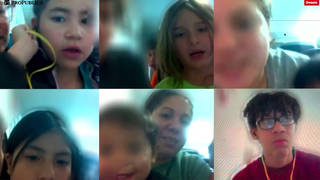
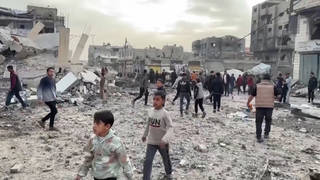








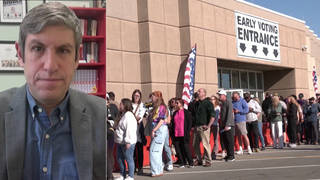
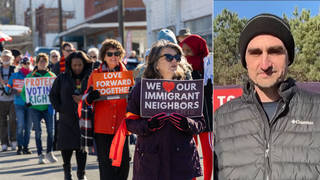
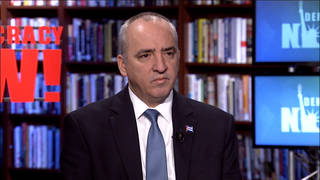
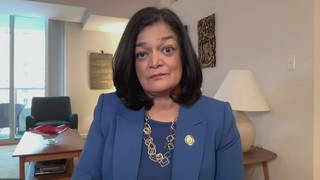

Media Options